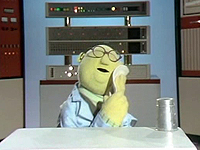
Ted Nield weighs a new caricature of modern science in the balance, and finds it wanting.
Geoscientist 19.2 February 2009
Geneticist and science commentator Professor Steve Jones has written that science is the most –maybe the only – "democratic" field of endeavour wherein, with diligence and application any intelligent person can make a genuine and worthwhile contribution. Science is a group effort, a massive common undertaking, like a termite mound. One can be a mediocre scientist, and still be useful. Alas, nobody has much use for mediocre poets or violinists. The arts by contrast, like nature, are cruel and wasteful.
I am sure Steve Jones would claim no originality for this observation. Sir Peter Medawar made the same point, and in The Limits of Science used it to highlight science’s social benefit - whereby a “poor boy of average ability” could achieve “a certain place in life, a measure of self esteem and a reason for feeling it”.
Oh dear, but there is a snag apparently. According to Bruce Charlton, professor of theoretical medicine at the University of Buckingham, scientists today are – “dull and getting duller”. Thanks to the pressures to churn out paper after paper and fill in endless forms for bean-counters, those exceptional, creative, and picturesque scientists (the ones who make the paradigm shifts and can be recognised by their wild hair, loosely waisted trousers and a hearty disrespect those who make the rules) are quitting the field. Instead, these wayward paragons of brilliance are heading for ragamuffin artsy professions - like journalism good God above - where the trammels of conformity (Charlton rather innocently believes) are less onerous, and creative mischief is still to be had.
His theory was first expounded in the Oxford Magazine last year. Like Medawar’s, and to an even greater extent C P Snow’s view of scientists, Charlton’s caricature is not exactly “gender-neutral”; but this is probably inevitable, as he harks back to an alleged golden age when weird but wonderful men of science were allowed to be just that.
Needless to say most flak has come from those very people he describes as “dull”, “less intelligent” and “more boring” than their forebears, and the Royal Society that represents them. But that is to be expected. Any caricature, if it is a good one, has to be rooted somewhere in truth. To be sure, this one works well for Einstein. But as we celebrate the 200th birthday of Charles Darwin this month, one is bound to ask how it measures up against him. Darwin may have been an old sea dog with a beard you could hide a badger in (© Richard Curtis). But he was also precisely the sort of mild-mannered, inoffensive, socially conformist bod that Charlton would recognise as one of the grey dregs whom he regrets are all that’s left in science today. Yet, despite such “disadvantageous” character trait (and as Sally Gibson points out in this issue), Darwin’s really big idea was not his only one. Indeed, his insight and brilliance (as well as his care for detail) extended to everything he touched – including his first love, geology.
This, one hopes, is enough to sink Professor Charlton’s theory - and to uphold instead an observation by Darwin’s defender, the Society’s former president Thomas Henry Huxley, concerning grand theories, and their fate at the hands of ugly little facts…
Further reading
- Clever Crazies quitting science by Zoe Corbyn. Times Higher Education 27 November 2008
- And - to find out what Bruch Charlton normally gets up to: http://charltonteaching.blogspot.com